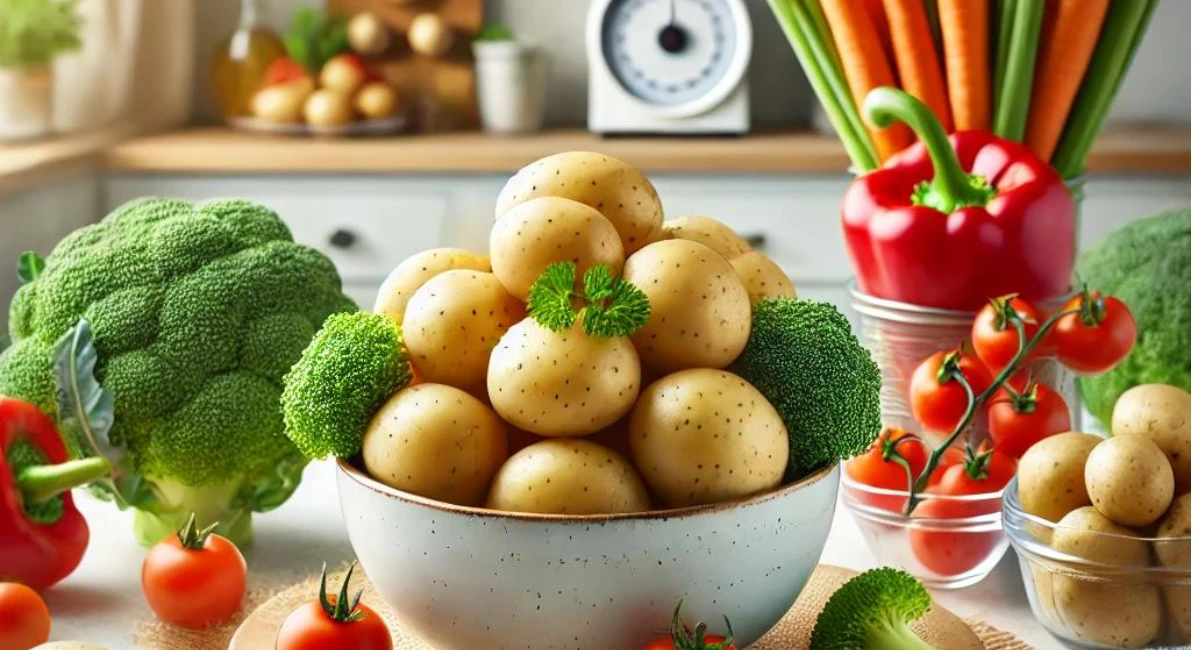Are Potatoes Good to Eat When Trying to Lose Weight?
When it comes to weight loss, potatoes often get a bad reputation due to their association with high-carb diets and calorie-dense preparations like fries and chips. However, when consumed in their natural, unprocessed form, potatoes can actually be a great addition to a balanced diet, even for those aiming to lose weight.
Potatoes, both white and sweet varieties, are nutrient-dense foods that offer numerous health benefits. While many people are concerned about their carbohydrate content, it’s important to remember that not all carbs are created equal. Potatoes provide complex carbohydrates, fiber, vitamins, and minerals, making them a healthy choice when prepared in the right way.
Nutritional Profile of Potatoes
Potatoes are often misunderstood in the context of weight loss due to misconceptions about their carbohydrate content. Here’s a breakdown of their key nutrients (per 100 grams of boiled potato):
| Nutrient | Amount | % Daily Value (DV) |
|---|---|---|
| Calories | 87 kcal | 4% |
| Carbohydrates | 20.1 g | 7% |
| Protein | 1.9 g | 4% |
| Fiber | 1.8 g | 7% |
| Potassium | 379 mg | 11% |
| Vitamin C | 19.7 mg | 22% |
| Vitamin B6 | 0.3 mg | 15% |
| Magnesium | 21 mg | 5% |
As you can see, potatoes offer several key nutrients, including fiber, which plays a critical role in promoting satiety and aiding in weight management.
Do Potatoes Help with Weight Loss?
If you generally follow a healthy diet and stay away from excessive consumption of junk foods, eating potatoes may not cause weight gain. In fact, potatoes—both white and sweet—can contribute to weight loss when incorporated into a balanced diet for the following reasons:
- Low in Calories: Potatoes are relatively low in calories. A medium-sized baked or boiled potato contains around 110-150 calories, making them a filling yet low-calorie food option.
- High in Fiber: The fiber content in potatoes can help increase feelings of fullness, which can lead to a reduced intake of calories throughout the day. Fiber also promotes healthy digestion, which is essential for effective weight management.
- Rich in Nutrients: Potatoes are a source of essential vitamins and minerals, including potassium, which helps regulate fluid balance in the body. They also provide vitamin C and B vitamins, which are crucial for overall health and energy production.
How Potatoes Affect Satiety
Potatoes have a high satiety index, meaning they are more likely to make you feel full compared to other foods with the same calorie count. This can be particularly helpful for those trying to reduce calorie intake. The reason behind this is the combination of fiber and resistant starch found in potatoes, which takes longer to digest, keeping you fuller for longer periods.
Resistant Starch and Its Role in Weight Loss
Resistant starch is a type of carbohydrate that acts like fiber in the body. It is not fully digested or absorbed in the small intestine, which means it doesn’t contribute as many calories as regular starch. Foods high in resistant starch, like potatoes (especially when cooled after cooking), can help improve gut health and enhance fat burning by increasing fat oxidation.
Here’s why resistant starch in potatoes can be beneficial for weight loss:
- Improves digestion: Resistant starch feeds the good bacteria in your gut, which may improve digestion and reduce inflammation.
- Promotes fat burning: It helps increase the body’s ability to burn fat, especially when you consume potatoes after they’ve cooled (such as in potato salad).
- Reduces hunger: By promoting satiety, resistant starch helps control hunger and reduce overall calorie intake.
How to Eat Potatoes for Weight Loss
To maximize the health benefits of potatoes without sabotaging your weight loss efforts, it’s essential to choose healthy cooking methods and portion sizes. Here are some tips:
- Avoid fried preparations: Fried potatoes, such as French fries and potato chips, are calorie-dense and high in unhealthy fats. Stick to boiling, baking, or steaming your potatoes instead.
- Pair with lean protein and vegetables: Potatoes can be part of a balanced meal when paired with lean proteins like chicken or fish, and non-starchy vegetables like spinach, broccoli, or peppers.
- Watch your portions: While potatoes are healthy, portion control is key. Overeating any food, including potatoes, can lead to excess calorie consumption, which could hinder weight loss.
Pros of Eating Potatoes for Weight Loss
- Nutrient-rich: Potatoes offer a wide range of essential nutrients that support overall health.
- High satiety index: Potatoes are very filling, which can help you eat fewer calories over time.
- Low in fat: When prepared without added fats, potatoes are naturally low in fat, which is important for weight loss.
- Versatile: Potatoes can be cooked in a variety of ways, offering flexibility in your diet.
- Affordable and accessible: Potatoes are inexpensive and available year-round, making them a cost-effective food for weight loss.
Cons of Eating Potatoes for Weight Loss
- High glycemic index (GI): Potatoes have a high GI, which means they can cause a rapid increase in blood sugar levels. However, this effect can be mitigated by cooling the potatoes after cooking or pairing them with other low-GI foods.
- Easily turned unhealthy: Potatoes are often consumed in less healthy forms, such as fries or chips, which are high in unhealthy fats and calories.
- Portion control required: It’s easy to overeat potatoes, especially when mashed with butter or cheese, so portion control is necessary.
Bullet Points: Key Takeaways
- Potatoes are low in calories and high in nutrients, making them a good option for weight loss.
- Fiber and resistant starch in potatoes help promote satiety, reducing overall calorie intake.
- To maximize weight loss benefits, avoid frying potatoes and instead opt for boiling, baking, or steaming.
- Cooling potatoes after cooking increases their resistant starch content, which can enhance fat burning.
- Pair potatoes with lean protein and vegetables for a balanced, filling meal.
Sample Weight Loss-Friendly Potato Recipe: Baked Potato with Greek Yogurt and Chives

Here’s a simple, weight loss-friendly potato recipe that is both nutritious and satisfying.
Ingredients:
- 1 medium-sized potato
- 2 tablespoons of Greek yogurt
- 1 tablespoon of chopped chives
- Salt and pepper to taste
Instructions:
- Preheat your oven to 400°F (200°C).
- Scrub the potato and pierce it a few times with a fork.
- Bake for 45-50 minutes or until tender.
- Once baked, cut the potato in half and top with Greek yogurt and chives.
- Add salt and pepper to taste.
This recipe provides a filling meal with fewer than 200 calories, thanks to the protein-rich Greek yogurt and the fiber-rich potato.
Conclusion
Incorporating potatoes into your diet while trying to lose weight is not only possible but beneficial when done correctly. By choosing healthy cooking methods, controlling portion sizes, and balancing them with other nutrient-dense foods, potatoes can support weight loss efforts without compromising your health goals.
Ultimately, potatoes offer a variety of health benefits, including improved satiety, digestive health, and essential nutrients that can enhance your overall well-being during your weight loss journey.

